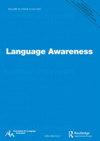Second language reading and recall processes under different reading purposes: an eye-tracking, keystroke-logging, and stimulated recall study
IF 2.2
2区 文学
0 LANGUAGE & LINGUISTICS
引用次数: 1
Abstract
Abstract This study explored second language (L2) reading and recall processes under different reading purposes, as reflected in their eye-movements during reading, keystrokes produced from summary writing, and stimulated recall comments. Seventy-two Korean undergraduate students read an English essay for different purposes, i.e., reading to extract the gist quickly (i.e., reading-to-skim) versus reading to prepare for a presentation (i.e., reading-to-learn), and wrote an unannounced summary of the essay. A subgroup of participants further produced stimulated recalls prompted by their own eye-movements and keystrokes. The results revealed that reading-to-skim led participants to engage in uninterrupted global text processing as manifested in significantly longer forward saccades and regressions. Those under the reading-to-learn condition, in contrast, showed significantly shorter eye-movements accompanied by constant pauses for local processing, while staying substantially longer on the essay. Reading-to-learn further resulted in more frequent pauses and revisions in the summary writing process, recalling a greater number of idea units from the essay. The findings of this study indicate that L2 learners prioritize distinct aspects of text processing depending on the reading purpose, which affects both reading and recall processes.不同阅读目的下的第二语言阅读和回忆过程:眼动追踪、按键记录和刺激回忆研究
摘要本研究探讨了不同阅读目的下第二语言(L2)的阅读和回忆过程,包括他们在阅读过程中的眼动、摘要写作中产生的击键和刺激的回忆评论。72名韩国本科生阅读一篇英语文章的目的不同,即阅读是为了快速提取要点(即阅读以略读),而阅读是为了准备演讲(即阅读学习),并对文章进行了未经宣布的总结。一组参与者进一步通过自己的眼球运动和按键产生刺激性回忆。结果显示,通过阅读来浏览会让参与者参与不间断的全局文本处理,表现为明显更长的向前扫视和倒退。相比之下,那些处于阅读学习状态的人表现出明显更短的眼球运动,并伴随着持续的局部处理停顿,而在文章中停留的时间则更长。为了进一步学习而阅读会导致总结写作过程中更频繁的停顿和修改,从而回忆起文章中更多的想法单元。本研究的结果表明,二语学习者根据阅读目的优先考虑文本处理的不同方面,这会影响阅读和回忆过程。
本文章由计算机程序翻译,如有差异,请以英文原文为准。
求助全文
约1分钟内获得全文
求助全文
来源期刊

Language Awareness
Multiple-
CiteScore
3.70
自引率
10.00%
发文量
18
期刊介绍:
Language Awareness encourages and disseminates work which explores the following: the role of explicit knowledge about language in the process of language learning; the role that such explicit knowledge about language plays in language teaching and how such knowledge can best be mediated by teachers; the role of explicit knowledge about language in language use: e.g. sensitivity to bias in language, manipulative aspects of language, literary use of language. It is also a goal of Language Awareness to encourage the establishment of bridges between the language sciences and other disciplines within or outside educational contexts.
 求助内容:
求助内容: 应助结果提醒方式:
应助结果提醒方式:


